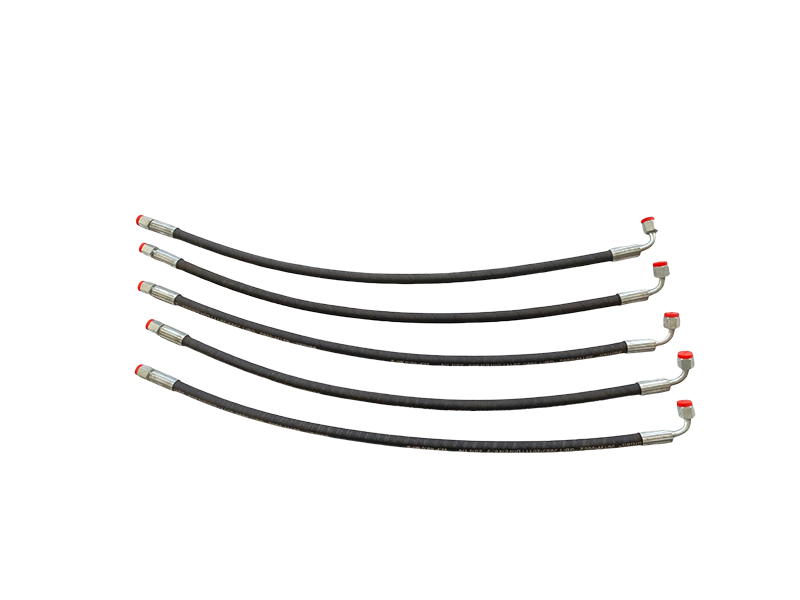news center
Understanding the Importance of Oil Filter Pipes in Industrial Equipment
2024-11-27
Understanding the Importance of Oil Filter Pipes in Industrial Equipment
Table of Contents
- 1. Introduction to Oil Filter Pipes
- 2. Functionality of Oil Filter Pipes
- 3. Types of Oil Filter Pipes
- 4. Materials Used in Oil Filter Pipes
- 5. Maintenance of Oil Filter Pipes
- 6. Impact of Oil Filter Pipes on Equipment Performance
- 7. Common Issues with Oil Filter Pipes
- 8. Conclusion
- 9. Frequently Asked Questions
1. Introduction to Oil Filter Pipes
In the realm of industrial equipment, **oil filter pipes** play a pivotal role in ensuring optimal functionality and longevity. These components are essential for maintaining the cleanliness of oil that circulates within machinery, preventing contaminants from causing damage. Understanding the significance of oil filter pipes can aid operators and maintenance teams in safeguarding their equipment and enhancing overall operational efficiency.
2. Functionality of Oil Filter Pipes
Oil filter pipes serve several critical functions in industrial machinery:
2.1 Filtration of Impurities
The primary function of oil filter pipes is to filter out impurities such as dirt, metal shavings, and other contaminants. This process ensures that only clean oil circulates through the engine or machinery, which is vital for performance and longevity.
2.2 Regulation of Oil Flow
In addition to filtration, these pipes help regulate oil flow. By maintaining a consistent flow rate, oil filter pipes support the efficient operation of hydraulic systems and engines, preventing excessive wear and tear.
2.3 Heat Dissipation
Oil filter pipes also assist in dissipating heat generated during the operation of machinery. By maintaining optimal oil temperatures, these components prevent overheating, which could lead to equipment failure.
3. Types of Oil Filter Pipes
There are various types of oil filter pipes tailored to meet the needs of different industrial applications:
3.1 Cartridge Oil Filters
Cartridge oil filters are designed for easy replacement. They consist of a filter element that traps contaminants, and once it becomes clogged, it can be replaced without needing to replace the entire housing.
3.2 Spin-On Oil Filters
Spin-on oil filters are a popular choice due to their simplicity and effectiveness. This type features a built-in filter element and can be easily removed and replaced by spinning it off and on.
3.3 Magnetic Oil Filters
Magnetic oil filters utilize magnets to attract metal contaminants. These filters are often used in high-performance applications where maintaining clean oil is critical.
4. Materials Used in Oil Filter Pipes
The materials used in constructing oil filter pipes significantly affect their performance and durability:
4.1 Steel
Steel is commonly used for its strength and durability. It can withstand high pressure and is resistant to corrosion, making it ideal for demanding environments.
4.2 Plastic
Plastic oil filter pipes are lightweight and resistant to corrosion. They are often used in applications where weight reduction is essential.
4.3 Aluminum
Aluminum offers a balance of strength and weight. It is often used in applications that require good heat dissipation and corrosion resistance.
5. Maintenance of Oil Filter Pipes
Regular maintenance of oil filter pipes is crucial for ensuring their effectiveness:
5.1 Routine Inspections
Conducting routine inspections helps identify any blockages or wear. Operators should check for signs of oil leaks or damaged pipes regularly.
5.2 Cleaning Procedures
Cleaning oil filter pipes can extend their lifespan. Depending on the type of filter, different cleaning methods may be employed, from simple visual inspections to more thorough cleaning processes.
5.3 Replacement Schedule
Establishing a replacement schedule based on the manufacturer's recommendations can prevent unexpected failures. Regularly replacing filters and pipes ensures that the system remains efficient.
6. Impact of Oil Filter Pipes on Equipment Performance
The performance of industrial equipment can be significantly influenced by the condition and efficiency of oil filter pipes:
6.1 Enhanced Machinery Longevity
By preventing contaminants from entering the system, oil filter pipes help extend the lifespan of machinery. This longevity translates into cost savings on repairs and replacements.
6.2 Improved Fuel Efficiency
Clean oil means improved engine performance, which can lead to better fuel efficiency. This improvement can result in reduced operational costs over time.
6.3 Reduced Downtime
Regular maintenance and effective oil filtration minimize the risk of breakdowns, resulting in less downtime for machinery. This efficiency is crucial for maintaining productivity in industrial settings.
7. Common Issues with Oil Filter Pipes
Despite their critical role, oil filter pipes can encounter several issues:
7.1 Clogging
One of the most common issues is clogging due to the accumulation of dirt and debris. Clogged pipes can restrict oil flow, leading to increased wear and potential equipment failure.
7.2 Corrosion
Corrosion can occur, especially in environments with high humidity or exposure to corrosive substances. Regular inspections can help identify early signs of corrosion.
7.3 Leaks
Leaks can lead to oil loss, impacting the efficiency of the system. Identifying and repairing leaks promptly is essential to maintain optimal operation.
8. Conclusion
In conclusion, oil filter pipes are indispensable components in industrial equipment, serving vital functions that contribute to machinery efficiency, longevity, and operational cost savings. Recognizing the importance of these components and committing to their maintenance can significantly enhance the performance and reliability of industrial systems. A well-maintained oil filtration system not only improves equipment longevity but also fosters a more efficient working environment.
9. Frequently Asked Questions
1. What is the main purpose of oil filter pipes?
Oil filter pipes primarily serve to filter out impurities from the oil and regulate oil flow to ensure optimal machinery performance.
2. How often should oil filter pipes be replaced?
The replacement schedule for oil filter pipes varies by manufacturer recommendations, but routine inspections can help determine when replacements are necessary.
3. What are the signs that an oil filter pipe needs maintenance?
Signs include reduced oil flow, visible leaks, unusual noises from the machinery, and warning lights indicating oil pressure issues.
4. Can oil filter pipes affect fuel efficiency?
Yes, clean oil filtered through efficient oil filter pipes can significantly improve fuel efficiency by ensuring optimal engine performance.
5. What types of materials are best for oil filter pipes?
The best materials include steel for durability, plastic for lightweight applications, and aluminum for a balance of strength and heat dissipation.
By understanding the importance of oil filter pipes and their role in industrial equipment, operators can ensure the efficiency and longevity of their machinery, making informed decisions about maintenance and replacements.
关键词
High Pressure Oil Pipe
High Pressure Hard Pipe
High Pressure Hydraulic Hose
Hotline
Add: Changfa Industrial Park, Lijia Town, Wujin District, Changzhou City
Fax: 86-519-8969086
language
English
العربية
বাংলাদেশ
Български
Hrvatski
Česky
Dansk
Nederland
 Esperanto
Esperanto
Slovenski
Filipino
Suomi
Français
Maori
 Shqiptare
Shqiptare
Georgian
 Euskara
Euskara
Deutsch
Ελλάδα
ישראל
इंडिया
Magyarország
Ísland
Indonesia
Irlanda
Italia
日本語
Sovensko
Հայաստան
한국
Kyrgyz
ປະເທດລາວ
 Zulu
Zulu
Latvian
Lithuanian
Luxembourgish
 Latinus
Latinus
Macedonian
Малайская
Maltese
Монгол улс
 Cymraeg
Cymraeg
ဗမာ
 தமிழ்
தமிழ்
नेपाल
Norge
ایران
Polska
Portugal
România
Российская
Србија
 Slovak
Slovak
Србија
 Slovak
Slovak
Bosanski
Slovenian
Беларус
España
Sverige
Точик
ประเทศไทย
Türk
Azərbaycan
Uzbek
 Afrikaans
Afrikaans
Việt Nam
Follow Us

Copyright©2022 Changzhou Guande Machinery Co., Ltd Powered by www.300.cn
Copyright©2022 Changzhou Guande Machinery Co., Ltd
This website already supports IPV6 | SEO | Cloud information



